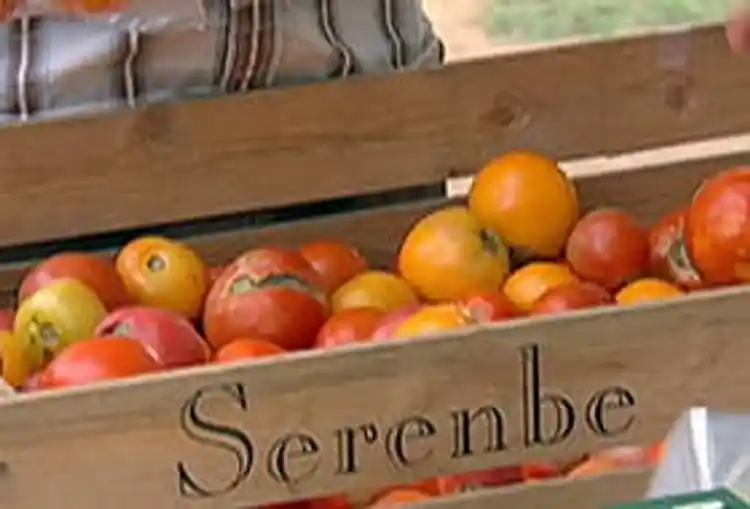Going Organic

Hide Video Transcript
Video Transcript
Paige Witherington
We are a certified organic diversified, mostly vegetable farm… Narrator
Paige Witherington takes families on educational tours of the fields that supply organic foods to this hamlet-style community outside of Atlanta known as Serenbe. Paige Witherington
This is our rooster…Do you guys want to see if he'll crow to us if we crow to him? : (crowing)
Narrator
These thousand or so acres-- connecting homes, shops, restaurants and ample green space—were designed as a model for a modern sustainable community. People who live here have chosen to move away from heavier carbon footprints and foods containing hormones, chemical fertilizers and pesticides… Steve Nygren is the community's founder: Steve Nygren
I think we're going to see in the next decade…one of the biggest changes is our food distribution system— 'cause people are becoming more aware…some of the food we're eating, some of the environments we're living in is what's making us sick. Narrator
That belief can still be disputed because data showing the precise dangers that various levels of toxins pose is still emerging. But most experts believe small children to be far more vulnerable to exposure than adults. Philip Landrigan, MD
…it makes sense to minimize their use if you have little babies, pregnant women, small children in the home. Narrator
Dr. Philip Landrigan is a lead researcher for the National Children's Study, a comprehensive effort to fill the knowledge-gap about environmental toxins and their long-term effects on human development. Philip Landrigan, MD
There's a great deal of research going on today…looking at chemical exposures in early life and the whole range of neurodevelopmental disorders in children. Neurodevelopmental disorders include dyslexia, attention deficit disorder, mild mental retardation, even autism… Narrator
The USDA has established strict standards for foods that get to carry a certified organic sticker, but doesn't currently back claims these products are safer or more nutritious. But if you are concerned, Landrigan has good news: Philip Landrigan, MD
…If a family switches to an organic diet, within a week they've washed most of the pesticides out of their body. So that's a very important practical tip that parents can take home. Narrator
More tips: If the price of organic food is a deterrent, split your produce budget between organic and conventional. Buy Organic for those items most likely to have higher concentrations of pesticide residue on them namely those that don't have to be cut into or peeled before being eaten. Shop around—look for local farms that use ecologically-friendly methods of growing or find a community organic farm. Locally-grown food is likely to be fresher, which does mean more nutrients and better taste. Steve Nygren
Seeds don't cost a lot.…it takes more energy but it doesn't take more money and you're going to be a lot healthier from the results of it. Narrator
Conventional or organic, it's a good idea to thoroughly rinse raw fruits and vegetables before eating them. For WebMD, I'm Damon Meharg. 
